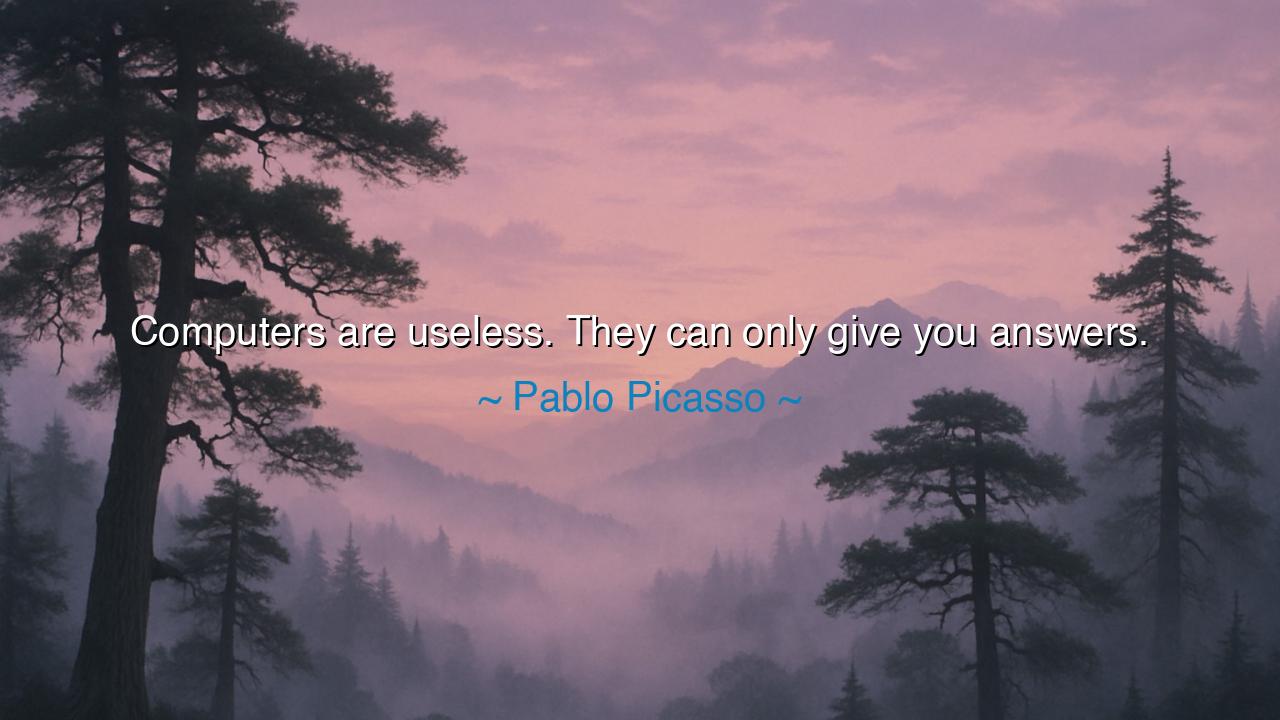
Computers are useless. They can only give you answers.






Listen, O Seekers of the True Path, for the words of Pablo Picasso echo through the corridors of time, urging us to reconsider the very essence of knowledge and creativity. He said, "Computers are useless. They can only give you answers." At first glance, these words may seem simple, even dismissive of the machines that have come to dominate our age. But beneath their surface, there lies a profound truth, one that calls us to return to the heart of creation, to the soul of inquiry, and to the deeper meaning of human ingenuity.
What Picasso speaks of is not a condemnation of technology, but a reflection on its limitations. A computer, as a tool, is not without merit; it can process vast amounts of data, provide information, and give us answers to questions we pose. But in the realm of art, creativity, and true understanding, answers alone are not enough. Answers are like stones in a path—useful for travel, but they do not reveal the landscape, the journey, or the soul of the explorer. Art, true creativity, is born not from answers, but from questions. It arises from the deep and unquenchable thirst for understanding, for expression, for exploration of the unknown.
The ancient Greek philosophers understood this well. Socrates, in his wisdom, did not simply seek answers—he asked questions, and in his relentless questioning, he uncovered deeper truths about the human soul, the nature of virtue, and the path to wisdom. The very act of questioning, of engaging with the mysteries of life, is what drives humanity forward. The machine, though powerful, cannot ask the questions that stir the heart, nor can it inspire the creative spark that burns within the human spirit. The answers it provides are finite, limited to what has already been known, and they do not reach into the unknown, into the realm of imagination and innovation.
Let us look to the life of Leonardo da Vinci, whose genius transcended the confines of his time. He was a man who sought not just answers, but who reveled in the mystery of the world. His mind was a fertile ground of curiosity, where art, science, and philosophy intertwined. When he painted the Mona Lisa, it was not to provide an answer, but to explore the complexities of the human expression, the mystery of the soul captured in a smile. The computer could never have conjured the emotional depth or the subtle intricacies of the Mona Lisa. It could only give answers, but answers, in this case, are not enough.
In the world we live in today, computers have become ubiquitous. They provide us with answers, answers to questions that once required the deepest reflection, the most creative of minds. Yet, in our reliance on them, we risk losing something far more precious—the ability to ask the right questions. We must not forget that true innovation, whether in art, science, or philosophy, comes from a willingness to explore the unknown, to challenge what is given, and to seek the elusive, the mysterious, and the profound. Picasso, in his mastery of the canvas, never relied on the answers provided by others; he created from his own deep well of curiosity, emotion, and insight.
We must not allow ourselves to be lulled into complacency by the convenience of answers. In our pursuit of knowledge, we must remember that the journey is as important as the destination. The act of questioning, of exploring the unknown, is what drives us to new heights. Just as the ancient stargazers peered into the heavens, not knowing what they would find, but driven by the need to understand the vastness of the cosmos, so too must we approach life with wonder and curiosity, unafraid of the mysteries that lie before us.
So, O Seekers, let us heed the wisdom of Picasso. Let us not allow ourselves to be slaves to answers, for they are but the echoes of questions already asked. Instead, let us embrace the power of questions, the beauty of the unknown, and the infinite potential of human creativity. Just as Picasso created his masterpieces with boldness and curiosity, so too must we approach our own lives—with the courage to ask, to explore, and to discover the answers that lie beyond the reach of the machine. Answers may guide us, but it is the questions that will lead us to true greatness.






AAdministratorAdministrator
Welcome, honored guests. Please leave a comment, we will respond soon